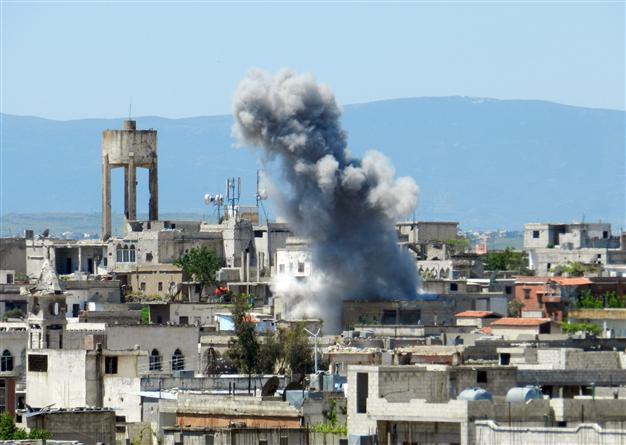Iran says use of chemical arms by anyone in Syria is "red line"
DUBAI - Reuters

A picture taken on April 26, 2013 shows smoke rising after shelling in Houla in Syria's Homs province. The opposition National Coalition has accused the regime of using chemical weapons in the northern province of Aleppo, in Homs in central Syria, and in rebel-held areas near Damascus. AFP photo
Iran said on Tuesday it regarded the alleged use of chemical weapons in Syria's civil war as a "red line", echoing major adversary the United States but saying Syrian rebels were the main culprit and not the Damascus government.Last week Washington said it had "varying degrees of confidence" that Syrian government forces had likely used the nerve agent sarin on a small scale against rebels fighting to overthrow President Bashar al-Assad.
U.S. President Barack Obama has warned Damascus that deployment of chemical weapons could trigger consequences for Assad - language widely interpreted to include military intervention so far shunned by Washington. Obama has also called resort to chemical arms a "red line" Assad must not cross.
In calling chemical weapons use a "red line" for Iran, Foreign Minister Ali Akbar Salehi did not indicate what action Tehran - one of Assad's staunchest political and military allies - might take in the case that a poison gas attack by either side in the conflict were to be proven.
"We have always emphasised that the use of chemical weapons on the part of anyone is our red line," Salehi said, according to the ISNA news agency. "Iran is opposed to the use of any kind of weapon of mass destruction, and not just their use but their production, accumulation, and use."
Salehi also reiterated calls for the United Nations to investigate assertions by the Syrian government that Syrian insurgents had used chemical weapons.
"On Syria," he said, "we have also requested that in accordance with the Syrian government, which emphasises that the opposition has used these weapons, the United Nations...identify the main culprit in this regard, which is the opposition."
The Syrian government and the opposition blame each other for alleged chemical attacks in Aleppo in March and Homs in December. Syria wants U.N. investigators to look into only the reported Aleppo attack, but U.N. Secretary General Ban Ki-moon wants the inquiry he has ordered to cover both incidents.
Ban said on Monday that investigators have been gathering and analysing available information on alleged chemical attacks in Syria, but access to the war-torn country was essential for a "credible and comprehensive inquiry."
Iran counts itself as the biggest victim of chemical weapons attacks in recent history, saying up to 100,000 Iranians were exposed to the effects of Iraqi poison gas during the two neighbours' 1980-88 war. Other studies have estimated that around 60,000 were affected.
Tehran, however, is suspected by Western powers of seeking another form of mass-destruction weapons capability - nuclear - with its shadowy uranium enrichment programme. Iran denies this, saying it seeks nuclear energy only for peaceful purposes.
















